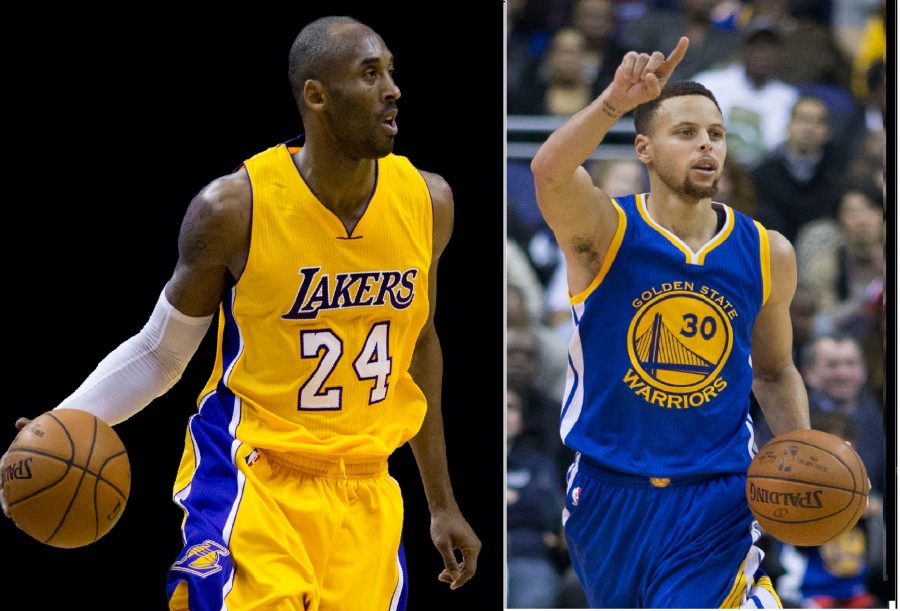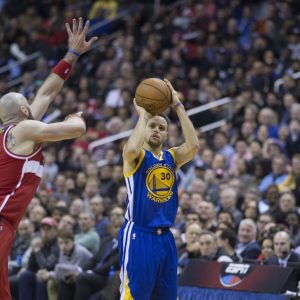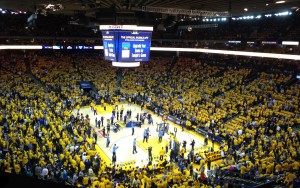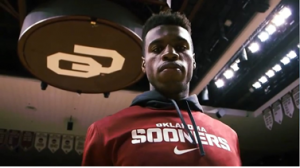Beyond the Game: Bryant and Curry’s careers highlight the importance of sports media
Wikimedia Commons
Kobe Bryant (left) and Stephen Curry (right) both had record-breaking performances on Apr. 13. But the interesting maturation of both players suggests the vital role of criticism in sports and media perception in sports.
April 22, 2016
372 miles separated the end of an era and the rewriting of history.
In Los Angeles, 37-year-old Kobe Bryant capped off his 20-year, illustrious career with a vintage 60-point clutch performance, a Hollywood-esque denouement to his NBA life. Meanwhile, in Oakland, the reigning NBA MVP, 28-year-old Stephen Curry, led the Warriors to the best regular-season win total in NBA history, as the team went 73-9 to take the record from the 95-96 Chicago Bulls.
The combination of these literally simultaneous events made April 13, 2016 one of the most captivating days in NBA history. Yet the individual performances and broken records of the night were overshadowed by the apparent metamorphoses of Kobe and Steph’s respective careers to that point.
While most 18-year-olds were adjusting to the college experience, Kobe, a 6’6” guard drafted out of Lower Merion High School in 1996, was beginning to make a name for himself in one of the most competitive leagues in the world. Only a couple seasons after first stepping onto the NBA hardwood, fans and media had already started comparing him to Michael Jordan, arguably the best basketball player of all time, for his cold-hearted competitiveness, unmistakable finesse, and sheer athleticism.
Kobe and his incessant demand for greatness led to criticism and adoration. From the “Black Mamba’s” five championship rings and ability to lay it all on the court night after night to his estranging leadership style, strict basketball regimen and occasional narcissism, people either loved Kobe or hated him. There was no rarely a middle ground.
Jump ahead more than a decade after Bryant’s historic draft, and into the league comes Stephen Curry. Not the fastest, strongest, tallest or most scouted player at the time, Curry was a 6’3”, 181-pound point guard out of Davidson College. Plagued by ankle and foot injuries and a lackluster Warriors roster early on in his career, Steph struggled to evolve into a premiere point guard in the NBA.
Now with a capable roster and several injury-free seasons, Curry finds himself with the reigns of the NBA’s most potent offense. He leads the NBA in scoring, with 30.1 points per game. The Warriors achieved the greatest win total in NBA regular season history. It seems as if nobody can beat this team in a seven-game series.
Now, we have the ability to look in retrospect and marvel at the individual transformations of these two elite athletes. On one hand, Kobe entered the game as a reckless teenager and merciless leader and left as a matured veteran and a wise mentor. On the other hand, Steph entered the league trying to find his place in the NBA but is currently attempting to help Golden State win back-to-back championships after beating his own record for most 3-pointers in a single regular season with 402 this go-around.
Various catalysts may have led to Kobe and Steph’s individual maturations: self-empowerment, strive for perfection, responsibility to family or friends. The most impactful impetus might just have been criticism.
In professional sports, where million-dollar careers are on the line every day, most players don’t have the luxury to admit that critiques are valid. But, at other times, players accept the criticism and improve dramatically, proving the naysayers wrong.
Kobe realized that he needed to be a one-man show, not the typical leader, for him and his Laker squads to succeed. Meanwhile, Steph found himself vulnerable to injuries and undeveloped as a point guard before leading his team to this record-breaking season.
Yet, the silver lining to the constant barrage of criticism from sportscasters and social media outlets is its potential to urge the criticized individuals to humble themselves and rebound by making bold, resounding statements that silence doubters.
“Everything negative—pressures, challenges—is all an opportunity for me to rise.” – Kobe Bryant.





![LALC Vice President of External Affairs Raeanne Li (11) explains the International Phonetic Alphabet to attendees. "We decided to have more fun topics this year instead of just talking about the same things every year so our older members can also [enjoy],” Raeanne said.](https://harkeraquila.com/wp-content/uploads/2025/10/DSC_4627-1200x795.jpg)


















![“[Building nerf blasters] became this outlet of creativity for me that hasn't been matched by anything else. The process [of] making a build complete to your desire is such a painstakingly difficult process, but I've had to learn from [the skills needed from] soldering to proper painting. There's so many different options for everything, if you think about it, it exists. The best part is [that] if it doesn't exist, you can build it yourself," Ishaan Parate said.](https://harkeraquila.com/wp-content/uploads/2022/08/DSC_8149-900x604.jpg)




![“When I came into high school, I was ready to be a follower. But DECA was a game changer for me. It helped me overcome my fear of public speaking, and it's played such a major role in who I've become today. To be able to successfully lead a chapter of 150 students, an officer team and be one of the upperclassmen I once really admired is something I'm [really] proud of,” Anvitha Tummala ('21) said.](https://harkeraquila.com/wp-content/uploads/2021/07/Screen-Shot-2021-07-25-at-9.50.05-AM-900x594.png)







![“I think getting up in the morning and having a sense of purpose [is exciting]. I think without a certain amount of drive, life is kind of obsolete and mundane, and I think having that every single day is what makes each day unique and kind of makes life exciting,” Neymika Jain (12) said.](https://harkeraquila.com/wp-content/uploads/2017/06/Screen-Shot-2017-06-03-at-4.54.16-PM.png)








![“My slogan is ‘slow feet, don’t eat, and I’m hungry.’ You need to run fast to get where you are–you aren't going to get those championships if you aren't fast,” Angel Cervantes (12) said. “I want to do well in school on my tests and in track and win championships for my team. I live by that, [and] I can do that anywhere: in the classroom or on the field.”](https://harkeraquila.com/wp-content/uploads/2018/06/DSC5146-900x601.jpg)
![“[Volleyball has] taught me how to fall correctly, and another thing it taught is that you don’t have to be the best at something to be good at it. If you just hit the ball in a smart way, then it still scores points and you’re good at it. You could be a background player and still make a much bigger impact on the team than you would think,” Anya Gert (’20) said.](https://harkeraquila.com/wp-content/uploads/2020/06/AnnaGert_JinTuan_HoHPhotoEdited-600x900.jpeg)

![“I'm not nearly there yet, but [my confidence has] definitely been getting better since I was pretty shy and timid coming into Harker my freshman year. I know that there's a lot of people that are really confident in what they do, and I really admire them. Everyone's so driven and that has really pushed me to kind of try to find my own place in high school and be more confident,” Alyssa Huang (’20) said.](https://harkeraquila.com/wp-content/uploads/2020/06/AlyssaHuang_EmilyChen_HoHPhoto-900x749.jpeg)













